Why there is so much hype surrounding keyword research?
Keywords are the fundamentals of successful SEO. Google is the most popular go-to information source and about 90% of people start their search with specific search terms.
These terms are called keywords. Keywords are primarily responsible for the organic traffic and ranking of your website. Websites appear at the top of the organic searches because they target the right keywords.
Imagine you create in-depth, valuable content, but if nobody is searching for it they won’t rank on SERPs. To get rank and target the right audience effectively you need to know how to research keyword that drives results.
If you are looking for a keyword research guide here it is. In this comprehensive guide, you’ll how to find, analyze, and choose the right keyword step-by-step.
Before digging into this let’s look at the definition of keyword research for understanding roots.
What is Keyword Research?
Keyword research is an SEO strategy for finding and analyzing search terms people are using to find specific information. Keyword research aims to optimize their content for maximum visibility and relevance.
Keyword research enables marketers to create content that resonates and ranks high in search engines. No matter what you are writing for you always have to conduct keyword research for effective SEO.
For example, my target audience for this blog is beginners, marketers, and small businesses finding the strategies of SEO.
If I want to make sure the presence of my blog in search engine when someone searches I have to choose keywords that people are using for finding the relevant information.
Why Keyword Research is Important?
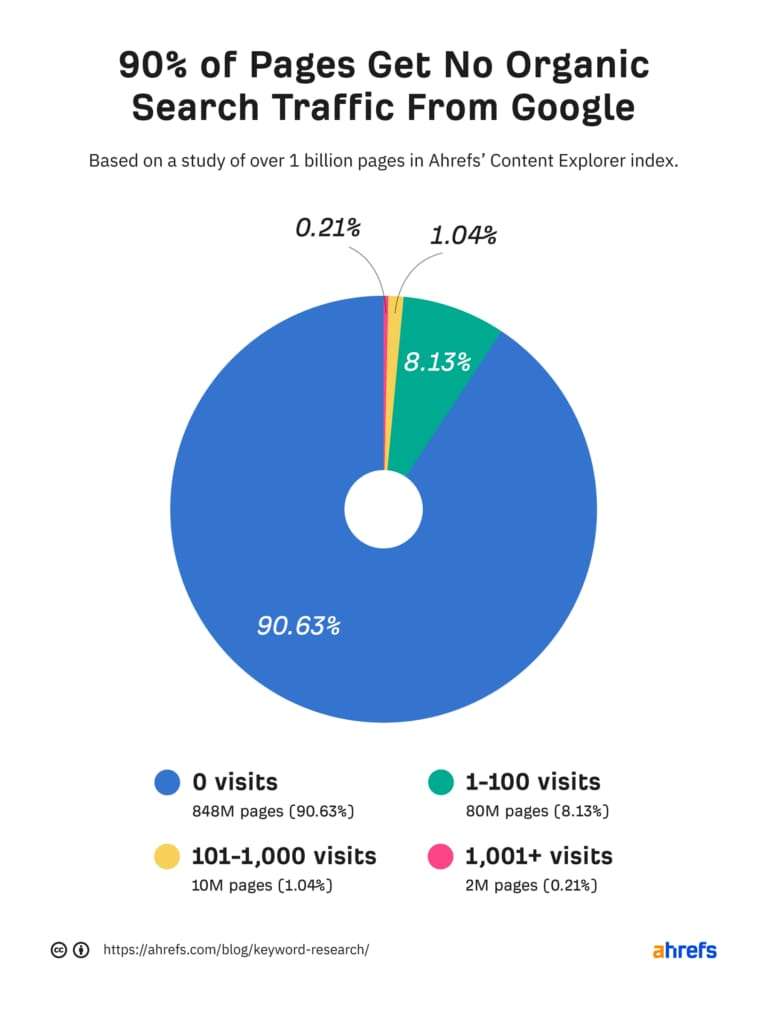
Why? What is the reason? There could be multiple reasons for this but keyword research is the main reason is not utilizing keywords in right way.
Keywords are the essential element of SEO. It allows marketers to gain insights into the search behavior of their target audience.
Let’s say you want to write but don’t know exactly which topic is most demanding. Keyword research helps not only to find the ranking search terms but also to find out topics you should write on.
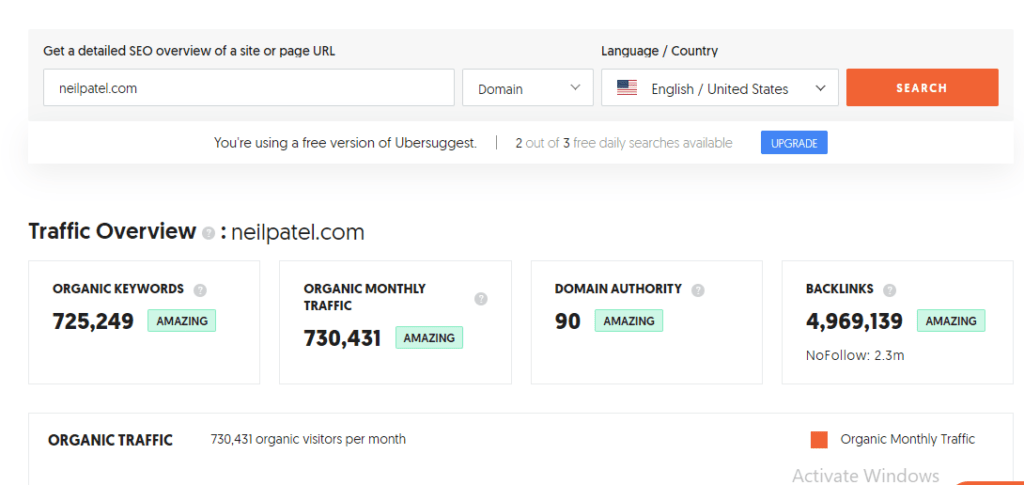
The blogging master Neil Patel gets 730,431 organic traffic every month. How? Obviously, he knows the tactics of finding keywords and works hard on making keyword strategies for their blog.
More Traffic= More leads/ conversions.
Trust me you can also get these results only if you know the methodology of keyword research. Also, it helps you to create pay-per-click (PPC) and SEO strategies that drive traffic to your site and improve your online presence.
Fundamental Elements of Keywords:
There are three essential elements of keywords you have to consider while conducting keyword research.
Relevancy:
Think why Google should rank your content if other content on the same topic already exists. Relevancy shows Google that this is content that provides more value than others.
It is a crucial element because it ensures that the content displayed in search engines is matched directly to the user intent.
For example, let’s say if someone searches for “iPhone 14 pro max” they might be expecting to see the reviews, features, and prices. But if your content contains other unrelated information they feel disappointed and hop on other relevant content.
That is the point where search intent comes in. Relevancy ensures the alignment between user search intent and the content you create.
Search Volume:
The end goal of marketers is to rank on the first page of search engines. Search volume refers to the number of searches taken on your selected keyword.
If no one searches for that keyword no matter how valuable or insights-rich content you have created it won’t rank.
By targeting keywords with significant search volume, you can optimize your content for relevancy and drive more organic traffic.
Take the example of Neil Patel’s blogs above he created content on almost every trending topic of SEO. That is the reason his site gets massive organic traffic.
Authority:
Authority refers to how trustworthy and credible your content is in Google’s eye. High-quality and authoritative content showcases expertise and adds value to your site.
It is like positioning your site as an authority in the industry with valuable and information-rich content.
If your content does not seem as authoritative you can’t compete with your competitor sites. To beat this neck-to-neck war on the first page of SERPs you have to make sure that your content provides accurate information and demonstrates expertise which are in back helps to establish authority.
How To Conduct Keyword Research?
Keyword vs. Topic:
Topic and keywords. Do they mean the same thing? They can be used interchangeably?
The answer is a big NO.
Topics refers to the broad term that also includes keywords. In contrast, keywords are the terms or phrases to take to select the topic of your content.
The myth is keywords are sufficient for effective content optimization or they hold greater value than the topic. However, smart SEO professionals always keep a balance between both of them.
You can use keywords to identify what kind of content your audience needs and what you should create. But saying the keyword is the sole factor is wrong.
Over the past 10 years, SEO has changed a lot, with keywords being less crucial for ranking.
I know it might seem weird to you but the truth is Google Ranking Authority considers the search intent as key scale.
If your content resonates with the search intent and provides valuable content it is most likely to rank. Make sure you incorporate keywords in a well-optimized and natural way that does not harm the user experience.
Analyze Competitor and Own Website:
If you are using WordPress, go to Site Kit and see which keywords you are already ranking for. It helps you to find which keywords are driving traffic to your site or what people might expect from your site.
By understanding which keywords performing well you can improve your SEO strategy to target similar keywords and create further related content on them.
In case, you don’t have direct access to the analytics or using some other site for writing. You can simply use Analytics tools available online.
For example, Google Search Console completely audits your website and gives in-depth results.
Now, come to another way is analyze competitor websites. A wise man always takes inspiration from her rival.
I hope you already understand what I mean by that. Look up keywords your competitors are ranking for.
Make a list of those keywords but do not use them directly. Take those keywords and refine your own keyword selection.
Is it looking hard? Take a deep breath and think of it as a roller coaster. Go through their keyword selection report and analyze their content.
Find the gaps in their content and see which topics or keywords haven’t been covered extensively at all. Dive deep find how they create content and engage with their audience.
You can use audit tools like Ubersuggest, go to Ubersuggest enter their URLs and see for what keywords they are ranking.
Step 1: Keyword Discovery:
The initial phase of keyword research is brainstorming new keywords. I admit it’s the most difficult part of keyword research but without searching for new keywords you cannot compete.
Many times people stick around the vague phrases that no one is likely to search for instance “Fitness + Healthy Diet+ Nutrition Coaching. Believe these types of phrases just bring disappointments.
Make sure you find keywords that are more relevant and suitable according to your niche or industry.
This is not the final step. You just make a seed list of keywords that resonate with your niche.
Start with the focus primary keyword and fill your bucket with the other related keywords. Make a list in Google Docs or a spreadsheet to record your data.
Select keywords based on search intent. I would suggest combining informative and commercial keywords with a 75/25 ratio.
It makes your content not just informative but also a sweet spot for user action. The next step is to understand your audience and meet their needs.
Why do audiences matter and what role do they play?
Understanding the audience is the most crucial step as Google prefers user experience first. You should know what type of content they want and what problems they face. and other related queries.
Go through each of your content comment sections, forums, and communities and see what people might expect to get from you.
After understanding the behavior of the audience find what search terms people use to find you. Use these terms and add them to your keyword bucket.
Engage with your audience, participate in related communities, and ask them to give you suggestions. This helps you to find the most relevant and demanding topic.
You can also use keyword research tools to find out the trending keywords without any effort. For example Google Ads Keyword Planner.
Let’s take a look at the Google keyword planner and see how they will help us.
First, you have to sign with your Google account or email.
Then enter your target keyword and it will show you a list of keywords with the following terms.
Avg. Monthly Searches:
This refers to the number of times a particular keyword is entered into the search engine for a particular query. It shows you the data for about 12 months. For example, if the keyword has a 500 search volume it means it is searched for 500 times per month.
Ad Impression Share:
It refers to the number how often your ads are being seen by people or divided by how many times they could have been seen. If your ad impression is high it means your ad is expected to reach more people.
Competition:
The competition column shows you how competitive your selected keyword is. Go for low-competition keywords to rank quickly.
Top of the bid:
The top of the bid has two columns high range and low range. This gives you the expected number advertisers willing to pay for this keyword based on location and network setting. It may vary from time to time.
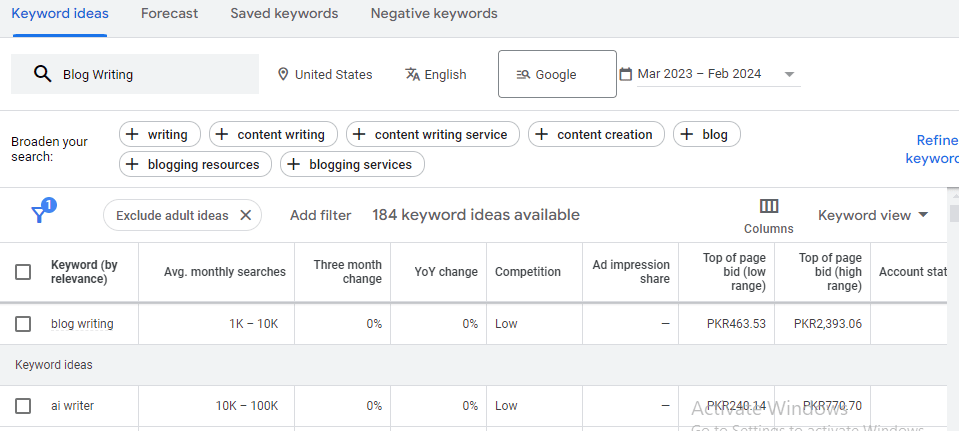
Analyzing and Choosing the Keywords:
Now take a step forward and finalize the keywords strategy. You have the complete set of keywords that you have to analyze and jot down.
Let’s first talk about the search intent. Search intent means the purpose or goal of user search. Just simply put yourself in the audience’s shoes. Think about what would they like to know. Search intent is mainly of 4 types.
Navigational Intent: People search to find specific websites or data. e.g. Facebook login, Brand name.
Informational Intent: As the name shows user wants to learn or get information about a specific topic. e.g. What is cryptocurrency?
Transactional Intent: It’s related to action. Users want to take specific action. e.g. Purchasing, Downloading, etc.
Commercial Intent: Users want to get educated before taking specific action. e.g. Best sneakers online with free delivery.
SEMrush authority has created a perfect difference visual for clearer view. (Source SEMrush).
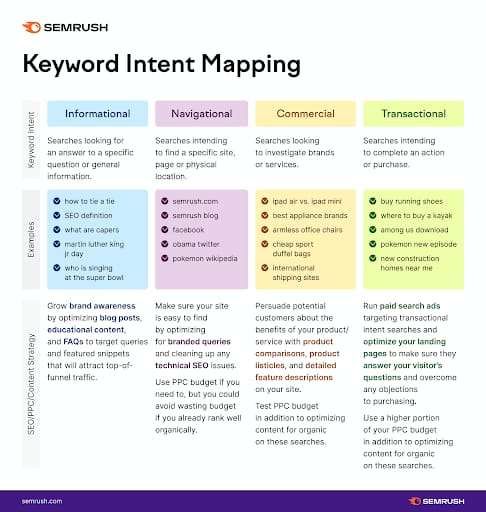
Search intent is considered the most essential element of keyword research. Think of it you write enriching informative and valuable content but it does not solve the user problem they simply skip over it.
For example, if you search for “How to do the SEO by yourself?” it means you are searching for a comprehensive guide and direction to do it. Make sure your content is closely related to the Google search intent.
Let’s look at one more example, if you search for “Cold Coffee” you see the top results are of informational intent.
But wait let’s take one step more and see the results for “Best cold coffee” the results for this are completely changed.
That’s why search intent is considered as game changer and you should pay attention to it.
Once you understand the roots of keyword research, start searching for related keywords, synonyms, or secondary keywords. I divided keywords into three major terms for the ease of your understanding.
Short-Tail Keywords:
Short-tail keywords are more specific and target a broad spectrum. They are considered more generic with a high search volume. For example, “Running Shoes”, “Cupcakes”, and “Fashion”, etc.
Long-Tail Keywords:
Long-tail keywords are long search phrases with low search volume. They are more specific and have a closer intention in mind. For example, “Best running shoes for athletes”, Why SEO is Important?”, etc.
Latent Semantic Indexing (LSI):
They are basically the synonyms or closely related terms of your primary keyword. This helps you to avoid keyword stuffing and cannibalization.
For example, if you are writing about “affiliate marketing” you must have a list of other related keywords like revenue sharing, affiliate programs, referral marketing, etc.
After changing in Hummingbird algorithm LSI and long-tail keywords become the crucial elements of keyword strategy.
Now the question is which keywords are most effective? It is mostly preferred by marketers to use both short and long-tail keywords with a balance.
But in the past few years, it has been seen that long-tail keywords drive more traffic than short-tail keywords. Over 70% of search queries are for long-tail keywords with a conversion rate of 36%.
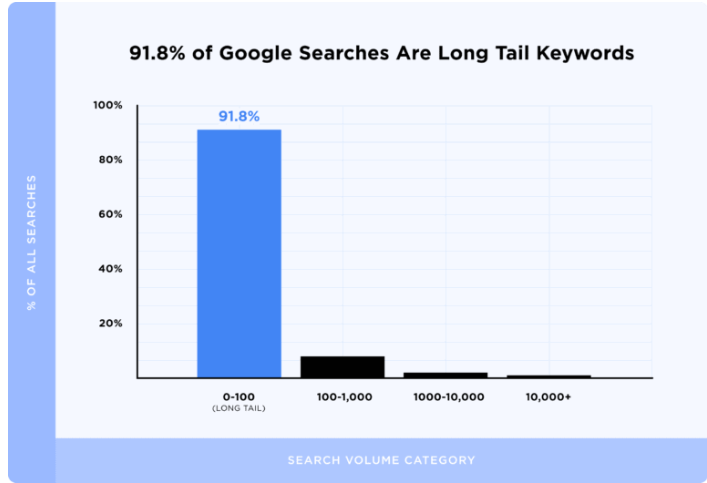
Keywords Hierarchy:
In case you don’t understand just look at the image below it shows how every sub keyword has a list of related keywords.
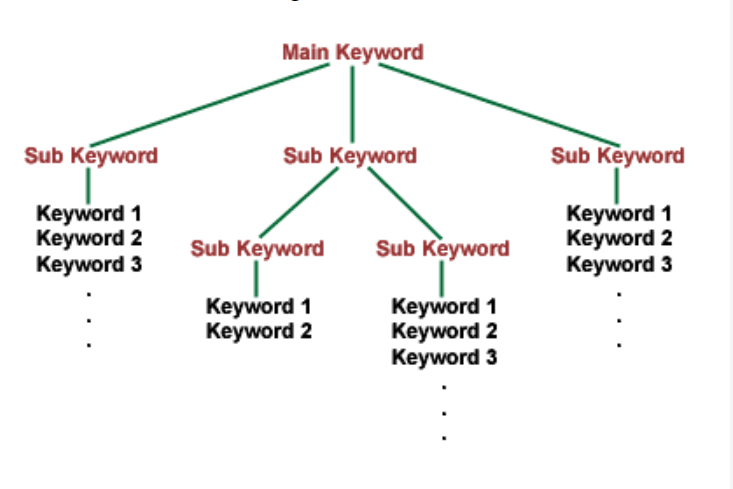
Placement of Keywords:
After choosing keywords you have to know how to place those keywords in content. Placements matter a lot if you just randomly throw keywords in your content it creates keyword cannibalisation (multiple keywords competing in one site make a fuss).
Incorporate keywords in a natural way that entices readers throughout the content.
Never compromise on user experience because they are the main asset of any website.
Keyword Research Tools:
Many keyword and SEO tools are available that give deep insights and help you to find the best suitable keyword. Here is the list of popular keyword research tools you can create SEO keyword strategy.
- Ahrefs
- SE Ranking
- Google Ads Keyword Planner
- SEMrush
- Ubersuggest
- Moz
- KeywordTool.io
- Keywords Everywhere
- KWFinder
- Keyword Research Tool
- Google Keyword Planner
- SECockpit
Things to Keep in Mind While Using Keyword Tools:
There are certain essential points you should know while conducting research with the above tools. Let’s say you are using Ubersuggest, first, take a look at the “Search Volume”.
Choose keywords with high search volume. They have a relatively high potential of driving traffic. But remember you might find those keywords in very tough competition.
However, at the start target keywords with medium search volume. They may not attract as much traffic but they are easier to rank.
Next, organic and paid difficulty. It refers to the competition in organic and paid search. The higher the SEO difficulty lesser the chance of ranking.
Aim for keywords with low SEO difficulty. The last factor is cost-per-click. It is most important in PPC campaigns. It helps to find keywords that dole out into maximum ROI.
Scroll down and look for variations of your primary keywords and content ideas.
Frequently Asked Questions about Keyword Research:
What is keyword research?
Keyword research is the process of targeting keywords that drive results. It is the base of every SEO campaign.
Is keyword research important for paid campaigns also?
Yes, you must have to conduct keyword research for every campaign. No matter if it is an organic or paid campaign. Make sure to take keywords with average CPC.
Are keyword tools free to use?
Many tools have free versions you can use, though you can buy their paid subscription to unlock additional data and features. “You don’t need to invest a significant amount in costly SEO tools to make a list of quality keywords, however.”
Conclusion of Keyword Research:
I hope this guide will help you to conduct keyword research confidently.
Remember, this is a comprehensive guide and I try my best to explain everything you need to know about keyword research.
First, calm down, I admit at the start digesting all this information at once is difficult.
But believe me, after working on SEO for 10 years I came to this point that keywords will always remain the pivotal part of any Marketing strategy.
To avoid any tragedy you should keenly pay attention to this. And at the end, I would like to advise you to be consistent.
Consistently may not guarantee you to be successful in the market. But without consistency, you must lead to only failure.
So create consistently high-quality content and prioritize your audience first. Engage with them, consider their suggestions or behavior seriously, and act according to them.
